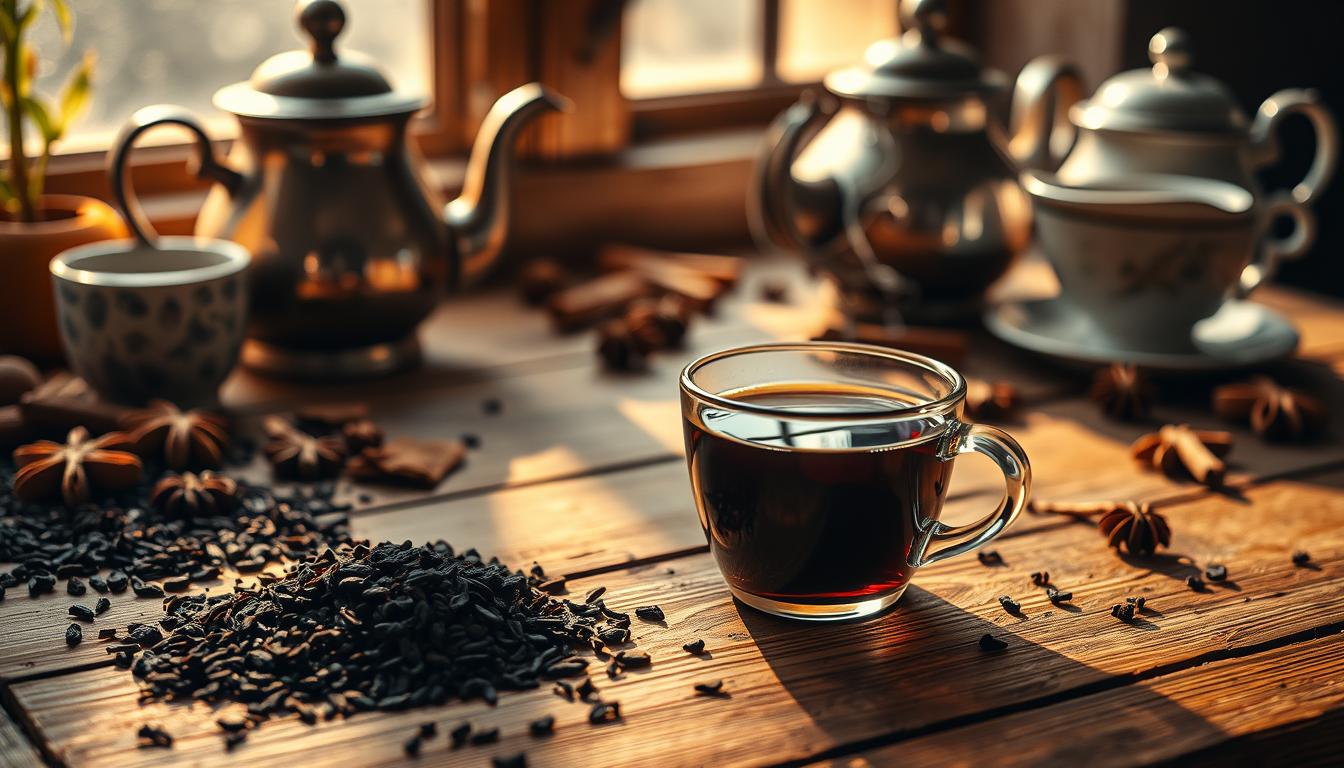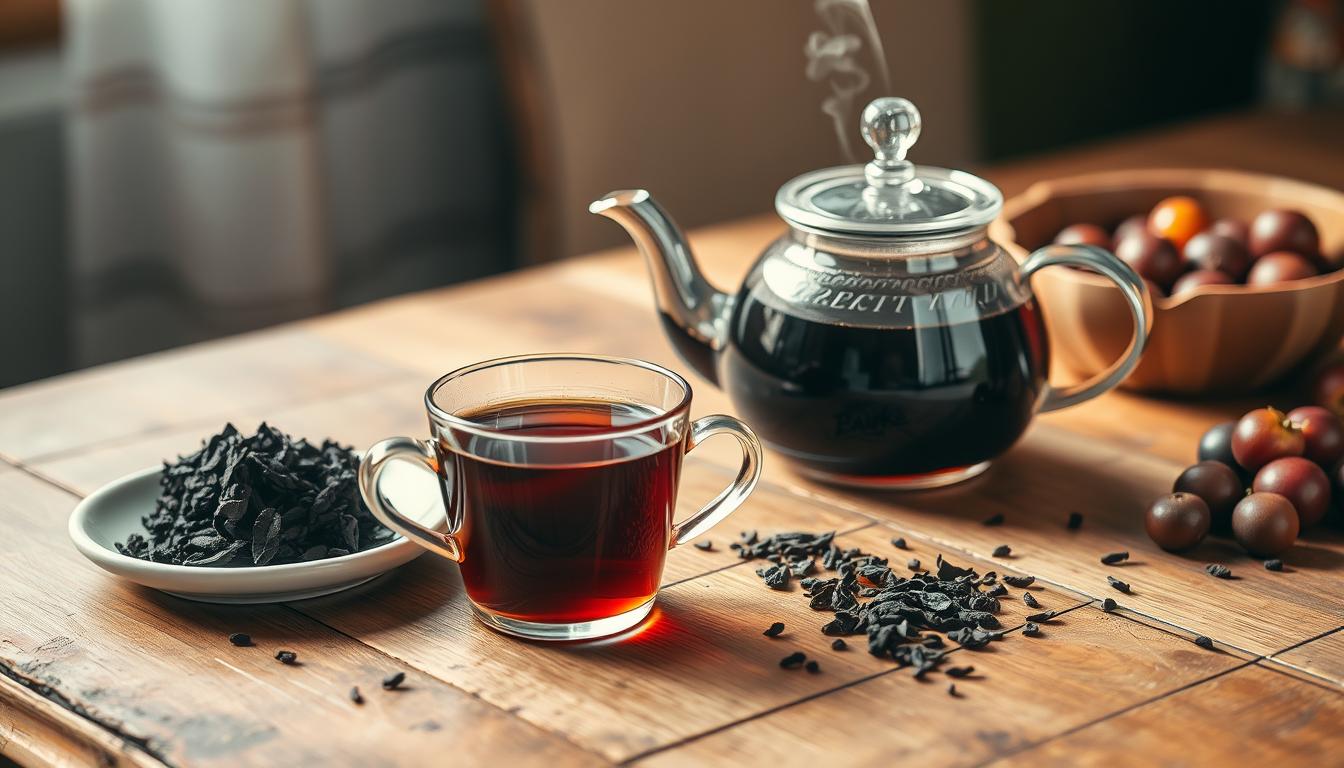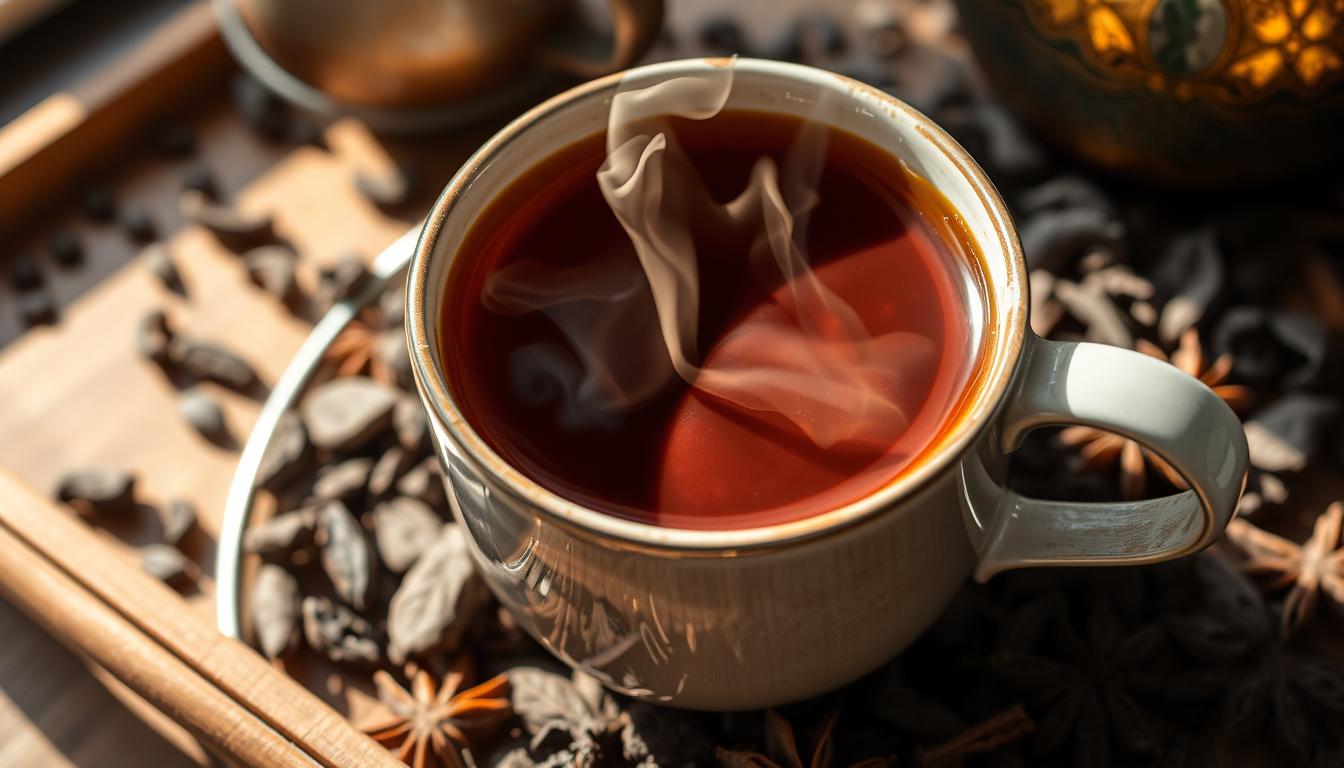Dark tea is becoming more popular around the world. It’s known for its rich flavors and unique taste. This tea offers a complex and satisfying experience, making it stand out from other teas.
Dark tea is special, with its earthy and smooth notes. It’s a must-try for anyone who loves tea and wants to try new flavors. Its distinct taste and health benefits make it a favorite among tea lovers.
Key Takeaways
- Dark tea has a unique and complex flavor profile
- It is a type of tea that undergoes fermentation, giving it a distinct taste
- Dark tea offers numerous health benefits, making it a great choice for tea enthusiasts
- It is a rich and smooth brew, perfect for those looking to try something new
- Dark tea has a significant cultural impact, especially in China where it originated
- It is a great choice for those looking to explore the world of tea and its many flavors
Introduction: What Sets Dark Tea Apart from Other Teas
Dark tea is becoming more popular around the world. It has a unique flavor and a rich history. Understanding what makes it different from black, green, and white tea is key.
Dark tea’s taste is often described as earthy, woody, and smooth. It’s different because it goes through a special fermentation process. This process, along with its origins, makes dark tea a standout.
An introduction to dark tea and its growing popularity
Dark tea is known as a fermented tea. This sets it apart from other teas. The fermentation process changes the tea leaves, creating its unique flavor and aroma.
How dark tea differs from black, green, and other teas
The main difference is in how it’s made. Black tea is fully oxidized, while green tea is barely oxidized. Dark tea, however, is fermented after oxidation. This gives it a distinct taste.

- Unique flavor notes: Dark tea has a distinct taste that’s different from other teas.
- Post-fermentation process: This process adds to its unique taste and aroma.
- Cultural significance: Dark tea has a deep cultural history in some regions.
In summary, dark tea offers a unique taste and cultural importance. Its popularity is growing because of these special qualities.
Understanding Dark Tea: The Basics
Exploring dark tea, it’s key to know the dark tea basics that make it unique. The special processing method is a big part of this. This method includes fermentation, which adds to the tea’s taste and health benefits.
The fermentation process is what makes dark tea taste earthy and look dark. It can last from months to years, depending on the tea. The longer it ferments, the stronger the taste and darker the color.
What exactly is dark tea?
Dark tea, also called post-fermented tea, is made through a special processing method with fermentation. This method lets the tea leaves oxidize and then ferment. This creates its unique flavor and smell.
The unique processing method behind dark tea
The processing method for dark tea is detailed and includes steps like withering, rolling, oxidation, and fermentation. The fermentation step is what makes dark tea different. It gives the tea its special taste and health benefits.

Why dark tea undergoes fermentation or post-fermentation
The fermentation process in dark tea production is what makes it taste and smell unique. This process can last from months to years, depending on the tea. The longer it ferments, the stronger the taste and darker the color.
| Type of Dark Tea | Fermentation Period | Flavor Profile |
|---|---|---|
| Pu-erh | Several months to several years | Earthy, mellow, and smooth |
| Hei Cha | Several months | Earthy, floral, and slightly sweet |
| Liu Bao | Several years | Strong, earthy, and complex |
Key Flavor Notes of Dark Tea
Dark tea is famous for its rich and complex taste. This comes from the fermentation that happens during its making. It has earthy, woody, and smooth flavors, making it a unique drink.
The fermentation process is key to dark tea’s flavor. It makes the tea mature and develop a complex taste. This taste is often described as earthy and mellow. The type of tea leaves, fermentation time, and storage also affect its flavor.
Common Flavor Profiles
- Earthy and woody notes, reminiscent of moss and forest floors
- Smooth and mellow flavors, with hints of sweetness and spice
- Savory and umami flavors, often described as brothy or meaty
The complex taste of dark tea comes from fermentation and special making methods. As it ferments, the flavors grow, creating a rich and interesting taste. Whether you like earthy or smooth flavors, dark tea will please your taste buds.
Exploring the Different Varieties of Dark Tea
Dark tea is known for its rich flavors. Pu-erh is famous for its earthy taste. But, Hei Cha and Liu Bao also have their own special qualities.
The way dark tea is made affects its taste. Pu-erh’s fermentation gives it a unique flavor. Hei Cha, on the other hand, has a sweeter taste due to its processing.
Age also changes dark tea’s flavor. Aged Pu-erh gets even more complex. Here’s a table showing what makes each dark tea special:
| Tea Variety | Flavor Profile | Aging Process |
|---|---|---|
| Pu-erh | Earthy, mellow | Develops deeper flavor with age |
| Hei Cha | Slightly sweet, smooth | Less affected by aging |
| Liu Bao | Woody, earthy | Improves with age, but slower than Pu-erh |
Exploring dark tea varieties like Pu-erh and Hei Cha is a journey. Each one offers a unique taste experience. Tea lovers can enjoy the complexity and richness of dark tea.
How Brewing Dark Tea Influences Its Flavor
Brewing dark tea is an art that requires balance. The right water temperature, steeping time, and tea-to-water ratio are key. These elements shape the tea’s flavor, making it complex and nuanced.
The water temperature and steeping time are crucial. A higher temperature brings out the tea’s bitter notes. A lower temperature makes the flavor smoother. The steeping time also affects the flavor, with longer times making it stronger and shorter times more delicate.
The ideal water temperature for brewing dark tea is between 200°F and 212°F. The steeping time can range from 3 to 5 minutes, depending on your preference.
The Importance of Tea-to-Water Ratio
The tea-to-water ratio is also vital. The standard ratio is 1 teaspoon of loose-leaf tea per 8 oz of water. But, you can adjust this to suit your taste. A higher ratio makes the flavor stronger, while a lower ratio makes it lighter.
Dark tea often benefits from multiple steepings. This allows the tea leaves to unfurl and release their flavors. Steeping the tea 3 to 5 times, with each steep lasting 3 to 5 minutes, brings out its full flavor. You’ll experience a range of tastes, from sweet and smooth to deeper, earthier notes.
Optimal Brewing Conditions
| Factor | Optimal Condition |
|---|---|
| Water Temperature | 200°F – 212°F |
| Steeping Time | 3 – 5 minutes |
| Tea-to-Water Ratio | 1 teaspoon per 8 oz |
Understanding water temperature, steeping time, and tea-to-water ratio is key. Also, multiple steepings unlock dark tea’s rich flavors. Tea enthusiasts can enjoy the complex tastes it offers by mastering these brewing techniques.
The Role of Terroir in Dark Tea Flavor
Terroir is key in dark tea’s unique taste. It includes the environment where tea plants grow, like soil, climate, and height. Each region’s terroir makes its dark tea special. For example, Yunnan, China, is famous for its earthy dark teas.
The lush forests and red soil of Yunnan add to its dark tea’s flavor. The climate, with its right temperatures and rain, also shapes the taste. So, Yunnan’s dark teas are loved for their complex, smooth taste.
Regional Variations in Dark Tea Flavor
Dark teas from other Chinese regions also have unique tastes. These vary based on their terroir. Some teas are earthier, while others are sweeter and floral. Knowing about terroir helps tea lovers find the perfect dark tea for them.
Soil, Climate, and Elevation: Key Factors in Shaping Dark Tea Flavor
Soil, climate, and elevation also affect dark tea’s flavor. Rich soil makes teas more robust, while poor soil makes them lighter. Climate and elevation also play a part, with some teas being full-bodied and others subtle.
The Complex Relationship Between Age and Flavor in Dark Tea
As dark tea ages, its taste changes for the better. The flavors become smoother and the aroma deeper. This is especially true for aged dark tea, where the taste is more refined.
Young dark teas have a strong, earthy taste. But aged dark tea offers smoother flavors and a richer taste. The aging softens the tea’s tannins, making the flavor more balanced.
Aged dark tea has many benefits. Its flavors and aroma become more complex. It’s perfect for both tea lovers and newcomers to dark tea.
Some key traits of aged dark tea are:
- A more subtle and nuanced flavor profile
- A deeper, richer aroma
- Softer tannins and a more balanced taste
- A more complex and harmonious flavor experience
In conclusion, aging changes dark tea’s flavor in many ways. It makes the taste smoother and more refined. Whether you like young or aged dark tea, it’s a unique and fascinating choice.
Dark Tea’s Unique Aromas and Aftertaste
Dark tea offers more than just a first taste. Its aroma is key, with scents from earthy to floral. The aftertaste also plays a big role, leaving a memorable taste on your tongue.
The aftertaste of dark tea is smooth and lingers, with a clean finish. This clean finish is what makes high-quality dark tea stand out. The aroma adds to the taste, with a scent that’s rich and complex.
Some of the key characteristics of dark tea’s unique aromas and aftertaste include:
- A rich, earthy aroma that is both grounding and inviting
- A smooth, lingering aftertaste with a clean finish
- A complex flavor profile that is both savory and slightly sweet
As you enjoy dark tea, its aroma and aftertaste come together for a unique experience. It’s perfect on its own or with food, offering a rich taste that will impress anyone.
In conclusion, the aroma and aftertaste of dark tea are vital parts of its experience. They offer a complex and refreshing taste that’s satisfying for all tea lovers.
| Tea Type | Aroma | Aftertaste |
|---|---|---|
| Dark Tea | Earthy, floral | Smooth, lingering, clean finish |
| Black Tea | Strong, malty | Bold, slightly bitter |
| Green Tea | Light, grassy | Refreshingly light, slightly astringent |
Pairing Dark Tea with Food
Dark tea pairing offers endless possibilities. Its unique taste is perfect for many savory dishes. The earthy and woody notes in dark tea enhance the flavors of rich foods, creating a perfect balance.
Choosing the right dark tea is key for a great pairing. Options include savory dishes like beef or lamb, and sweet treats like chocolate or fruit. The goal is to match the tea’s flavors with the food’s.
Here are some tips for dark tea pairing:
- Pair earthy dark teas with savory dishes like mushrooms or beef
- Pair fruity dark teas with sweet options like chocolate or fruit
- Experiment with different food pairing options to find your favorite combinations
A great dark tea pairing can make both the tea and food taste better. By matching your dark tea’s flavor with the right food, you’ll enjoy a memorable meal. Whether you like food pairing with savory or sweet dishes, dark tea is a great choice.
| Dark Tea | Food Pairing |
|---|---|
| Earthly dark tea | Savory dishes like beef or lamb |
| Fruity dark tea | Sweet options like chocolate or fruit |
Conclusion: Why You Should Try Dark Tea
Dark tea offers a unique flavor that stands out from other teas. It has earthy and woody notes, with a smooth, complex taste. This makes it a must-try for tea lovers.
Looking for a comforting cup or a tea to go with savory dishes? Dark tea is perfect. Its versatility and rich flavor make it exciting for those wanting to try new things. So, why not start your dark tea journey and see what you discover?

